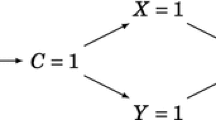Abstract
We examine a formal semantics for counterfactual conditionals due to Judea Pearl, which formalizes the interventionist interpretation of counterfactuals central to the interventionist accounts of causation and explanation. We show that a characteristic principle validated by Pearl’s semantics, known as the principle of reversibility, states a kind of irreversibility: counterfactual dependence (in David Lewis’s sense) between two distinct events is irreversible. Moreover, we show that Pearl’s semantics rules out only mutual counterfactual dependence, not cyclic dependence in general. This, we argue, suggests that Pearl’s logic is either too weak or too strong.
Similar content being viewed by others
References
Barker, S. (2003). Counterfactual analyses of causation: the problem of effects and epiphenomena revisited. Noûs, 37, 133–150.
Brand, M. (1977). Identity conditions for events. American Philosophical Quarterly, 14, 329–337.
Briggs, R. (2012). Interventionist counterfactuals. Philosophical Studies, 160, 139–166.
Choi, S. (2007). Causation and counterfactual dependence. Erkenntnis, 67, 1–16.
Davidson, D. (1969). The Individuation of Events. In N. Rescher (Ed.), Essays in Honor of Carl G. Hempel (pp. 216–234). Dordrecht: Reidel.
Ellis, B., Jackson, F., & Pargetter, R. (1977). An objection to possible-world semantics for counterfactual logics. Journal of Philosophical Logic, 6, 355–357.
Galles, D., & Pearl, J. (1998). An axiomatic characterization of causal counterfactuals. Foundations of Science, 3, 151–182.
Hall, N. (2000). Causation and the price of transitivity. Journal of Philosophy, 97, 198–222.
Halpern, J. Y. (2000). Axiomatizing causal reasoning. Journal of Artificial Intelligence Research, 12, 317–337.
Halpern, J. Y. (2010). From causal modesl to counterfactualstructures. Proceedings of the Twelfth International Conference on Principles of Knowledge Representation and Reasoning, 153–160. (Extended version to appear in The Review of Symbolic Logic).
Hitchcock, C. (2001). The intransitivity of causation revealed in equations and graphs. Journal of Philosophy, 98, 273–299.
Lewis, D. (1973). Causation. Journal of Philosophy, 70, 556–567.
Lewis, D. (1973). Counterfactuals. Oxford: Blackwell.
Lewis, D. (1979). Counterfactual dependence and time’s arrow. Noûs, 13, 455–476.
Paul, L. A. (2009). Counterfactual theories. In H. Beebee, C. Hitchcock, & P. Menzies (Eds.), The Oxford Handbook of Causation (pp. 158–184). New York: Oxford University Press.
Pearl, J. (2009). Causality: Models, Reasoning, and Inference (2nd ed.). Cambridge: Cambridge University Press.
Shoham, Y. (1990). Nonmonotonic reasoning and causation. Cognitive Science, 14, 213–252.
Spirtes, P., Glymour, C., & Scheines, R. (2000). Causation, Prediction, and Search (2nd ed.). Cambridge: MIT Press.
Stalnaker, R. (1968). A theory of conditionals. In N. Rescher (Ed.), Studies in Logical Theory (pp. 98–112). Oxford: Blackwell.
Strotz, R. H., & Wold, H. O. A. (1960). Recursive versus nonrecursive systems: an attempt at synthesis. Econometrica, 28, 417–427.
Woodward, J. (2003). Making Things Happen: A Theory of Causal Explanation. Oxford: Oxford University Press.
Woodward, J., & Hitchcock, C. (2003). Explanatory generalizations, part I: a counterfactual account. Noûs, 37, 1–24.
Zhang, J. (2011). A Lewisian logic of causal counterfactuals. Minds and Machines. doi 10.1007/s11023-011-9261-z
Author information
Authors and Affiliations
Corresponding author
Rights and permissions
About this article
Cite this article
Zhang, J., Lam, WY. & De Clercq, R. A Peculiarity in Pearl’s Logic of Interventionist Counterfactuals. J Philos Logic 42, 783–794 (2013). https://doi.org/10.1007/s10992-012-9249-z
Received:
Accepted:
Published:
Issue Date:
DOI: https://doi.org/10.1007/s10992-012-9249-z




